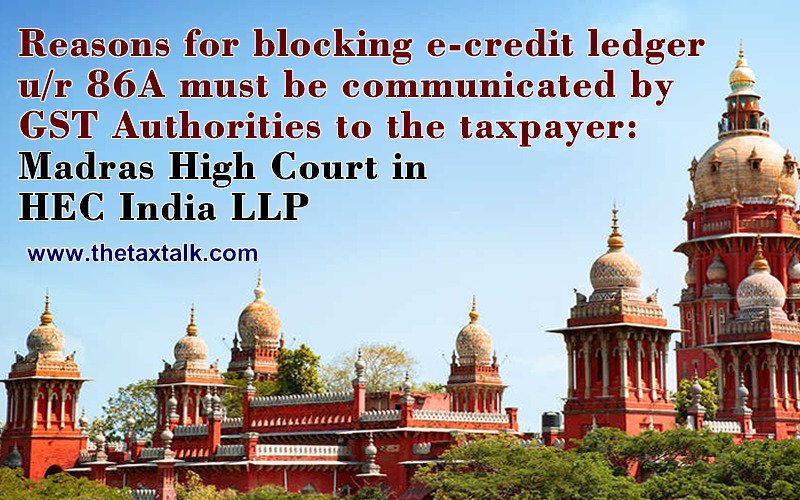![]()
Reasons for blocking e-credit ledger u/r 86A must be communicated by GST Authorities to the taxpayer: Madras High Court in HEC India LLP
Show Cause Notice was issued to the taxpayer proposing a demand for recovery of certain sums of money, on the alleged ground of non-payment of IGST on ocean freight charges, wrong/excess availment of ITC, etc. Taxpayer had replied to the notice and had also made a representation. However, powers under Rule 86A were invoked and electronic credit ledger was blocked without communicating any order to the taxpayer for invoking the power as such.
Madras HC made the following observations:
-
Power under rule 86A is a very drastic power conferred on the authority. Before invoking the power under Rule 86A, the authority should have reasons to believe that the credit of ITC available in the e-credit ledger has been fraudulently availed or the assessee is ineligible on account of any one of the contingencies in clauses (a) to (d) of rule 86A(1). That apart, the rule contemplates that the said authorities has to record the reasons in writing and not allowed to debit any amount equivalent to such credit in the credit ledger.
-
Having reasons to believe and recording such reasons in writing is a pre-requisite and in the absence of any reason, which has been recorded, the invocation of power under rule 86A should be held to be unauthorized, illegal and without jurisdiction.
-
The recorded reasons must be communicated to the assessee so as to enable him to put forth his objections and pray for release of blocking of e-credit ledger. Even if there is no such procedure provided for under rule 86A; we are required to read the principles of natural justice into the said Rule.
-
Applying the principles laid down by the Hon’ble Supreme Court in the case of GKN Driveshafts (India) Ltd. v. ITO reported in (2003) 259 ITR 19 (SC) the Madras HC stated that if the authority concerned has reasons to believe that the credit of input tax available in the electronic credit ledger has been fraudulently availed or the assessee is ineligible on any one of the grounds set out in the clauses from (a) to (d) of Rule 86A(1), then, the authority, after recording the reasons may not allow to debit of any amount equivalent to such credit in the electronic credit ledger. But, after doing so, the authority is bound to communicate the reasons, which weighed in his mind to pass such an order and not allow credit of any amount equivalent to such credit in the electronic credit ledger.


